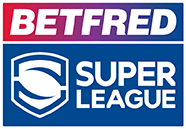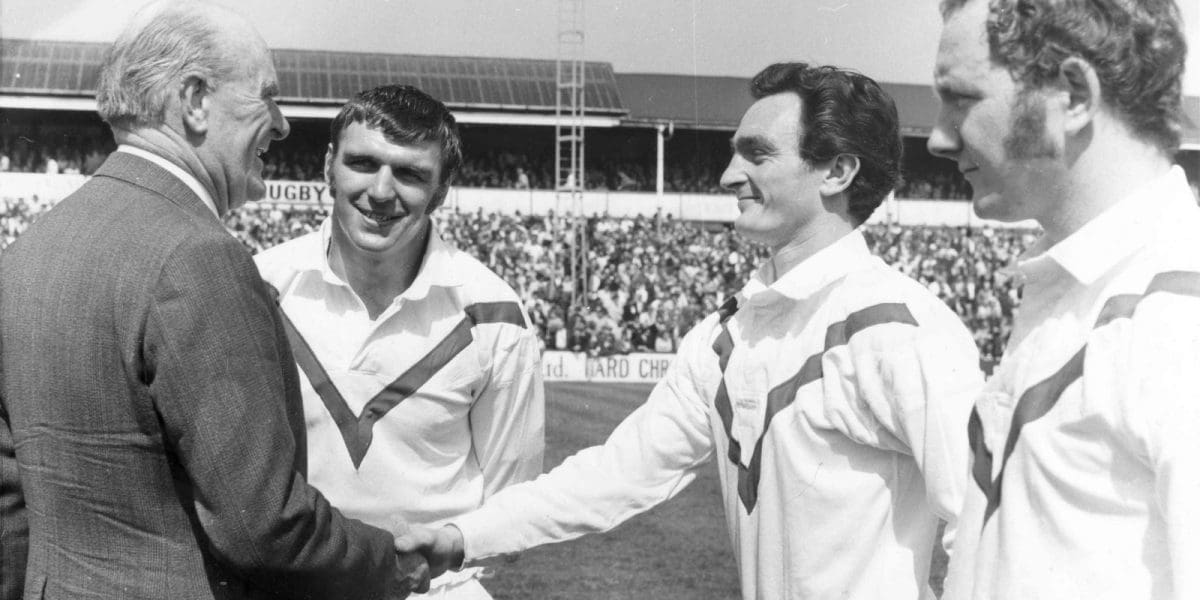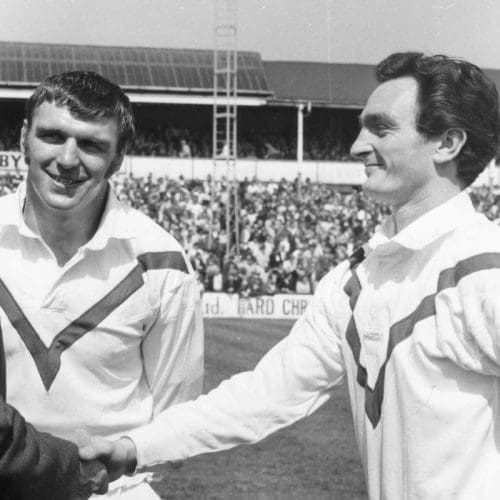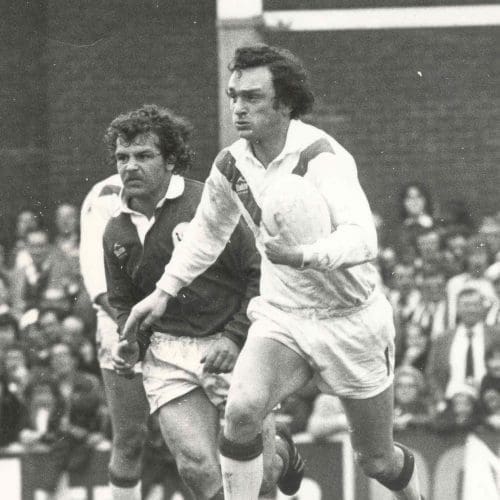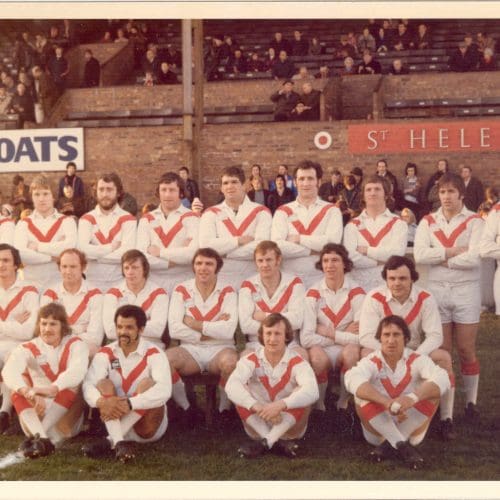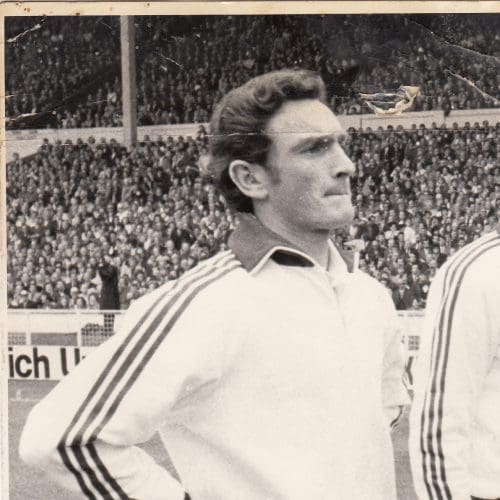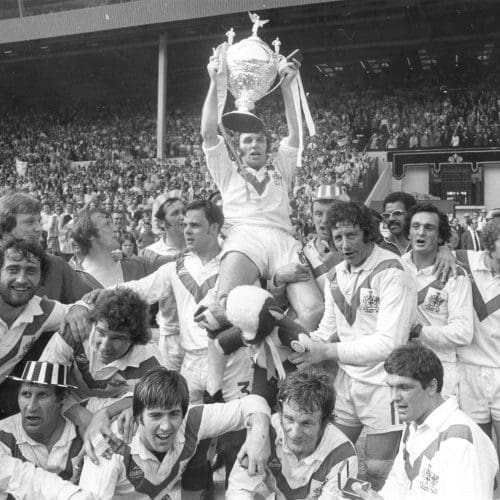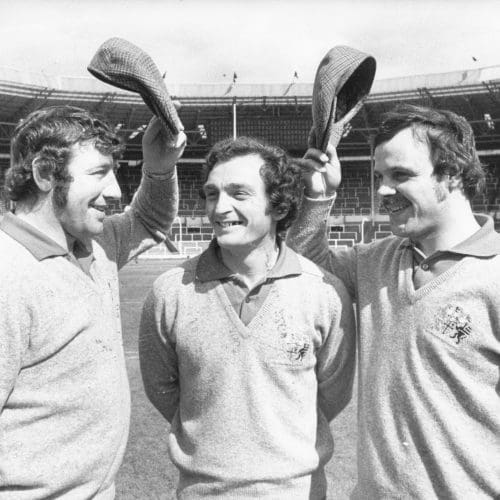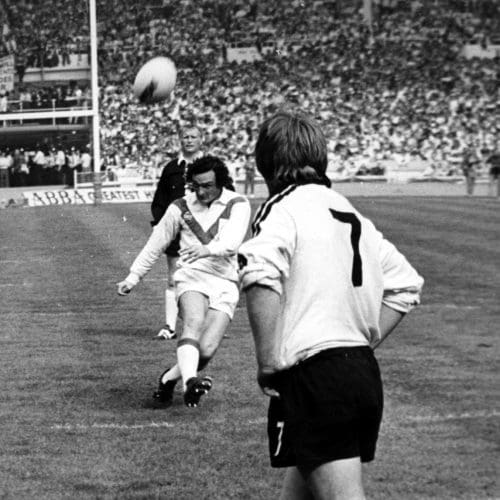Alex Service provides a fitting tribute to one of our most loved players, Geoff Pimblett, who passed away on Monday at the age of 73.
Born in the Laffak district of St. Helens, Geoff Pimblett showed he had tremendous sporting ability as a pupil at Windle junior school and later at Cowley Grammar School. He had tremendous hand-eye coordination and was a natural games player. Even then it was obvious that he was cool under pressure and was rarely, if ever, flustered. Although he was a quiet, somewhat reserved character, he had a total belief in his own ability that could never be described as arrogance, which every successful sportsperson has to have.
In rugby and cricket, he continued to flourish and by the late 1960s, he was an integral member of St. Helens RUFC and had picked up county honours, for Lancashire, in the process. In the summer months, he was a deadly fast bowler for St. Helens Cricket Club and also represented the Manchester Association. Many good judges reckon he was one of the quickest bowlers never to play for his county, but I digress.
He was never the biggest of players and his anticipation and timing had to compensate accordingly – another reason he was to achieve so much.
“I was quite happy playing rugby union with St. Helens RUFC at Moss Lane, where I was captain and that’s where I thought I would remain until Saints came in for me,” he recalled. “I was well into my twenties and they wanted me to play as an attacking full-back. I had been a centre in union, although I played a few games at stand-off before settling down in the number one jersey. I was really chuffed that they had approached me and it was the right time to do so for me, personally.”
What they got was an astute and intelligent footballer, with a nimble step and the ability to chime into the attack with deadly effect. It seemed as though his football brain was several notches ahead of his opponents and he made things look easy, such was his natural ability. He appeared to be so organised and unflappable, in command of most situations, whether in defence or attack. Geoff was also a fine goal-kicker, with a precise, chipped style, like a golfer with a nine-iron and could pop over crucial drop-goals if need be.
Geoff was 26 when he became a Saint on January 7 1971 and a change of codes was always a potential gamble. He played several games in the A team as a stand-off and was the back substitute for the visit to Whitehaven on February 27.
“You have to have some luck in the game and I remember the team got knocked out of the Challenge Cup by Leeds and perhaps it was then that they thought about giving me a chance to establish myself,” he recalled.
He wore the full-back’s jersey for the first time against Wigan on Good Friday at Central Park, with the Saints winning 9-6, in front of 24,017 and by the end of the campaign, 12 matches in fact, Geoff was playing a vital role in another Saints’ success over Wigan, at Swinton in the Championship Final, when they kept the trophy for the second successive year. He looked the part in the number one jersey too.
Geoff had certainly arrived at Knowsley Road at the right time. The next eight seasons were sprinkled with finals, winner’s medals and Man of the Match awards, as Geoff made the number one jersey very much his own. He was the first player to win both the Lance Todd Trophy [1976 v Widnes] and Harry Sunderland Trophy [1977 v Warrington] and after taking over the goal-kicking duties from his great friend Kel Coslett, he led the goal-kicking charts in 1977/78 with 138. He also became the only man to captain both St. Helens RUFC and St. Helens RLFC!
He made a sterling contribution towards Saints’ success in the 1972 Challenge Cup Final victory over a powerful Leeds side and was a virtual ever-present in the team that won the First Division Championship in 1975 at a canter. Yet it is the 1976 Challenge Cup Final that saw him produce his greatest performance.
“We were playing good rugby that season – the best I had experienced in a Saints’ side,” he remembered. “Once we got the breakthrough, you could enjoy the experience of playing at Wembley.”
Despite the intense heat, Pimblett revealed why he was such an asset to the Saints, with three conversions and two vital drop-goals as his ‘Dad’s Army’ side held their own – and more – against a much younger Widnes outfit. He was a constant threat to the Widnes defence all afternoon doing what he did best – linking up with the attack. It was a superb all-round performance worthy of the coveted Lance Todd Trophy.
“It was different in those days,” he remembered. “As we were lining up ready to go up for the cup, this fellow comes up to me and says ‘by the way, you’ve won the Lance Todd,’ which was a nice surprise – without doubt the highlight of my career.”
Following a 15-2 Premiership success against Salford seven days later, Geoff and his team-mates embarked on a short tour Down Under, playing against Easts at the Sydney Cricket Ground, but were beaten decisively.
The Saints, with Geoff in sparkling form, retained the Premiership trophy in 1977, with the 32-20 defeat of Warrington. Pimblett’s marvellous seven goals and a try earned him the Harry Sunderland Trophy outright, when, almost like an extra stand-off with his deceptive, jinking running style, he created wholesale panic in the opposition ranks! By this time, despite his relatively slight frame, he had also perfected a superb front-on ‘man-and-ball’ tackle. Not many got past him! He was more durable than many realised.
Geoff was the natural choice as Club Captain, following the departures of Billy Benyon and Kel Coslett and he skippered the team in the classic 1978 Challenge Cup Final against Leeds. Unfortunately, the heavier Leeds pack triumphed that day 14-12, in one of the classic Wembley finals. Indeed, the Captain could not disguise his disappointment: “I would have loved to have lifted up the cup for the fans, that’s my main regret, although it was a close game.”
Geoff became a ‘dual-code’ county player with his selection for Lancashire against Other Nationalities at Knowsley Road on November 25 1975, at right centre. He played once more, two years later, in his more accustomed full-back position, against Yorkshire at Naughton Park, Widnes. He also achieved a long-standing ambition by playing for England against Wales at Knowsley Road on May 28 1978.
It was a proud moment when Geoff heard of his selection: “There were some good full-backs around at the time, especially Wigan’s George Fairbairn, but I finally got my chance after Wembley. We stayed the night before in a hotel in Kirkby, which was a bit strange with me living so close to the ground anyway! But to play at Knowsley Road was always a pleasure – a superb, flat pitch, always in great condition.”
England won 60-13, the widest-ever margin between the two countries, yet Geoff delighted his supporters with a fabulous 21-point performance, nine goals and a try, a record for an England player at the time. Ironically, this was later broken by another Saints’ full-back, Steve Prescott, in 1996.
The 1978/79 season saw the Saints in relative decline, although the side battled through to the semi-final of the Challenge Cup against Wakefield. After a string of bad results, the unthinkable happened and Geoff was dropped before the game. The team itself had not been playing well in the run up and supporters thought that Pimblett had been made a scapegoat, especially when Saints lost 9-7 and he could have made quite a difference.
“I decided to call it a day after that,” he remembered. “I didn’t feel bitter, although the feeling of stability I felt had gone. In the mid-seventies I was making, perhaps four tackles in a match. Now it was in double figures! I played with the best and I had no intention of putting on a pair of boots again!”
But for the fantastic achievements of another superb full-back and local lad, Paul Wellens, Geoff would have been ‘nailed on’ as a member of the club’s Greatest 17. Even after his magnificent playing career had come to an end Geoff maintained his links with the St. Helens Club, right to the end. He was the Secretary and a founder member of the St. Helens Players Association, which has grown from strength to strength over the years and he was an integral part of the Saints’ Smart School, helping local primary schools who visited the club. He loved that. Geoff was also a trustee of the Saints’ Lottery.
Geoff was a brilliant history teacher at Grange Park High School, where another Saints’ great, Steve Llewellyn, was Deputy Head. He was a supremely organised person, an engaging personality and so well-respected by pupils and staff alike. When Grange Park became Broadway, he was Senior Master and remained a popular figure until his retirement in the mid-1990s.
A devoted family man, and married to Merle for more than 50 years, they have two daughters, Helen and Janet; five grand-children, Jarrod, Josh, Keeley, Hollie and Chloe, together with two great grandchildren, Zak and Eli. Indeed, his grandson Josh [Simm], has recently returned from the Saints’ Academy tour to Australia and, hopefully, has a great future ahead of him. Geoff was so proud of the progress he was making.
St.Helens R.F.C. has lost one of its greatest sons and we extend our sympathy to Geoff’s family at this sad time.
Geoff was always a very modest man, despite his considerable achievements and never one for fuss. He was an absolutely top-notch bloke, great company and so many will feel such a tremendous sense of loss at his untimely passing. He was truly one of our own.
Geoff Pimblett
Born: St. Helens May 11 1944
Died: St. Helens February 19 2018
Debut: February 27 1971 Whitehaven 8 St. Helens 15 [Lge]
Last match: April 1 1979 Wakefield Trinity 23 St. Helens 3 [Lge]
Appearances: 365
Tries: 48
Goals: 608
Drop-goals: 28
Points: 1,388

